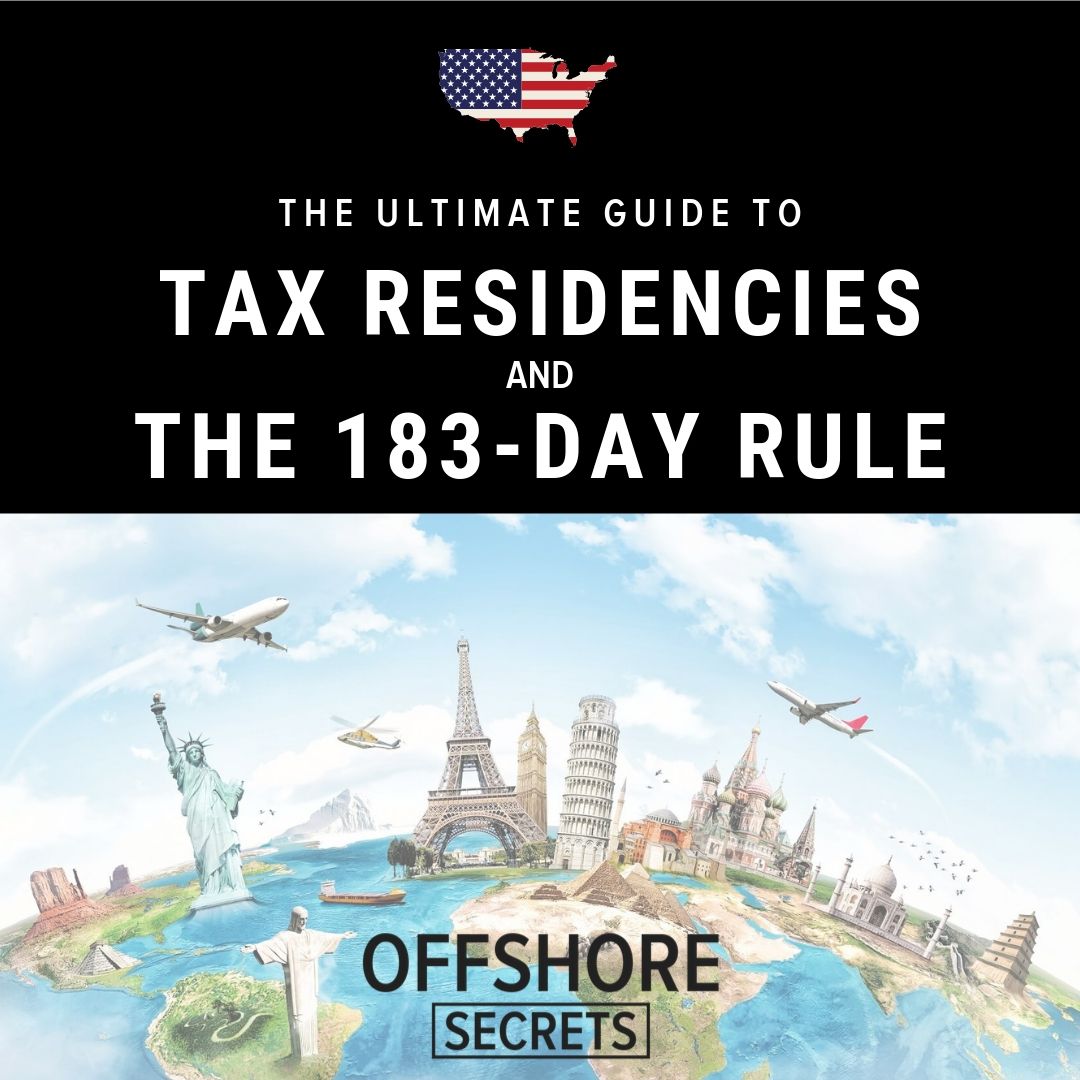Your personal tax residency is one of the most fundamental pillars in the flag theory. The ideal choice is highly individual, and you have to consider many different factors. In this article, I will answer the most important questions regarding the concept of residence and domicile, explain the notorious 183-day rule, and give some concrete examples of how to change your residence for tax purposes.
- What does the word “tax residence” mean?
- What is the 183-day rule?
- How to stop being a tax resident in your home country (domicile)
- How to stop being a tax resident of the UK 🇬🇧 (for UK citizens)
- How to stop being a tax resident of Canada 🇨🇦 (for Canadians)
- How to stop being a tax resident of Ireland 🇮🇪
- How to stop being a tax resident of Australia 🇦🇺
- How to stop being a tax resident of Spain 🇪🇸
- How to stop being a tax-resident of South Africa 🇿🇦
- What you should do next
- Frequently Asked Questions
This article is for you if:
✅ You’re open to the idea of one day leaving your home country (even for a few years)
✅ You’re running a location-independent business or are in the process of starting one (you should)
✅ You just want to be better informed about your options for the future
After you have read this article, you will know how to
⭐️ legally and ethically start saving millions on personal income tax
⭐️ avoid the critical (and costly) mistakes many people make here,
⭐️ how to drastically reduce bureaucracy
What does the word “tax residence” mean?
Your tax residence is the country, in which you are legally obligated to pay personal income tax. For the vast majority of the global population, their tax residency is identical to their home country. The country in which they were born, where they live, and where they work (their so-called ‘domicile’). And as long as the last two factors do not change, the tax residence will not chance.
“…but in this world nothing can be said to be certain, except death and taxes.”
Benjamin Franklin
Benjamin Franklin was a smart man, but I guess he didn’t anticipate the internet, and the possibility of perpetual traveling when he made that statement.
Then once you start to spend time in different countries, things become much more interesting. Because it is quite possible (and very feasible), to change your tax residency.
Personal income tax rates in Western countries, like Germany, Canada, Australia, New Zealand, the Nordic countries and the UK, regularly exceed 50%. Since tax residence and personal income tax are intimately connected, where you are a tax resident and pay income tax is obviously a major factor and will to a large degree determine your overall tax load.
And while being a tax resident of the mentioned countries, the local CFC rules will also prevent you from using low-tax (and low-bureaucracy) companies in offshore- or overseas jurisdictions.
Changing your tax residence away from those high-tax jurisdictions, to a jurisdiction with either a lower tax-rates or a territorial-based taxation system, is therefore a critical first step if you want to enjoy a tax-optimized, global lifestyle.
What is the 183-day rule?
The time that someone spends in a country is one of the most important factors to determine the tax residency. The so-called 183-day rule serves as a ruler and is the most simple guideline for determining tax residency.
It basically states, that if a person spends more than half of the year (183 days) in a single country, then this person will become a tax resident of that country.
While there are many factors that can make you a tax resident quicker, spending more than six months in a country is usually the definite cut-off point to achieving tax resident status.
Some countries apply modified versions of this residency test.
USA: Substantial presence test
While US-citizens have to declare their taxes whether or not they live in the country, the United States’ Internal Revenue Service (IRS) applies the so-called ‘Substantial presence test‘ (SPT) to determine whether an individual who is not a citizen or lawful permanent resident in the recent past qualifies as a ‘resident for tax purposes’.
The criterion of the SPT is this:
- The individual must have been physically present in the United States for at least 31 days in the year in question
- The total of (number of days present in the tax year) + (1/3)(number of days in the year before the tax year) + (1/6)(number of days in the year two years before the tax year) must be at least 183.
Switzerland: Tax resident after 90 days
Switzerland knows about its outstanding reputation and high-quality of living. If given the opportunity, many wealthy individuals would choose to spend a significant amount of time in that country.
So Switzerland significantly reduced the amount of time it takes to become a tax resident. If you are spending more than 90 days in the country, irrespective of short interruptions, Switzerland will consider you a resident for tax purposes.
How to stop being a tax resident in your home country (domicile)
As a resident of a Western, high-tax country, moving abroad, and becoming an expat or perpetual traveler can have significant tax benefits. But before you can reap the benefits of a lower tax country, you must first convince your own government to longer regard you as a tax resident.
- It is more difficult to stop being a tax resident of your home country, than a country you only resided in short-term.
- It is much easier to again become a tax resident of your home country, than a country you only reside in short-term.
Following are specific guidelines for a few key countries.
If you want us to add your country to the list, please comment below.
How to stop being a tax resident of the UK 🇬🇧 (for UK citizens)


The HMRC (Her Majesty’s Revenue and Customs) determines your tax status through the so-called “UK Statutory Residence Test (SRT)”.
Three sub-tests will hereby determine your tax status. We need to work through them in the exact order.
Test No. 1: The Automatic Overseas Test
Test No. 2: The Automatic Residence Test
Test No. 3: The Sufficient Ties Test
Automatic overseas test
If you meet any of these conditions, you will be treated as not tax-resident in the UK:
- You were a tax resident during at least one of the last three years but spent no more than 15 days in the UK in the current year.
- You were not a UK resident in any of the previous three years, and spent no more than 45 days in the UK in the current year.
- You work overseas full-time (at least 35h/week), spent no more than 30 days working in the UK (a “work day” is defined here as three or more hours) and spent no more than 90 days in the UK in the current year.
Automatic residence test
If you meet any of these conditions, you are deemed (tax) resident in the UK:
- Present in the UK for 183 days or more in the year.
- Your only or “main” home is in the UK. It needs to be accessible for 91 consecutive days or more and actually be used for at least 30 days in the year.
- Work full-time in the UK for any period of 365 days with no significant break of 31 days or more (this is subject to some conditions).
Sufficient ties test
If your residence status has not been determined through the first two tests, the HMRC now moves on to consider your connections to the UK.
- Family – spouse and/or minor children resident in the UK.
- Accommodation – available to you for 91 or more continuous days (even if you spend just one night there).
- Work – working in the UK for at least 40 days in the year.
- Substantial visits – spending 90 days or more in the UK in either or both of the two previous years.
- Favored country – spending more days in the UK than any other single country.
The key takeaways for entrepreneurs leaving the UK:
– Get rid of any apartments or houses in your possession, that could be interpreted as “available accommodation”. Permanently rent out any rental properties you own.
– Be prepared to spend nearly complete first year after your exit outside of the UK.
How to stop being a tax resident of Canada 🇨🇦 (for Canadians)


In order to become an emigrant of Canada for tax purposes, you need to meet all of the following conditions:
- You need to leave Canada, to live in another country
- You need to cut your residential ties with Canada
Significant residential ties include:
- a home in Canada
- a spouse or common-law partner in Canada
- dependents in Canada
Relevant secondary residential ties may include:
- personal property, such as furniture or a car
- social ties, such as memberships in recreational or religious organizations
- economic ties, such as bank accounts or credit cards
- health insurance with a Canadian provider
There are very few absolute rules here. If you need precise actionable advice, get in touch with us, and we can refer you to a tax experts familiar with the specific limits of these rules.
Sources:
Canada.gov | Leaving Canada
Canada.gov | Determining an individual’s residency status
How to stop being a tax resident of Ireland 🇮🇪


Ireland considers three criteria, to determine an individuals tax residence status: His residence, his “ordinary residence”, and his domicile status.
Residence is determined by physical presence
An individual is considered a resident in Ireland, if he is present for more than 183 days in a calendar year, or if he spends 280 days or more in Ireland in the both the current and preceding tax year combined. Spending less than 30 days in Ireland in the current year, automatically makes you a non-resident for that year.
Ordinary residence
If you were considered a resident for three consecutive years, you become an ordinary resident. This status does not expire until three years after you’ve stopped being a tax resident in Ireland.
As an ordinary resident, you will have to keep paying taxes on your domestic and foreign income, outside a few exceptions.
Those are:
Income from a trade or profession exercised outside of Ireland
Income from employment or self-employment that takes place outside of Ireland
Foreign income, if the total amount is less than €3,810
How to stop being a tax resident of Australia 🇦🇺


Australia uses four different residency tests to determine if an individual is a resident for tax purposes in Australia.
- the ‘resides test”
- the ‘domicile test’
- 183-day test (relevant for arrivers), and
- the Commonwealth superannuation test
You need to fail all of them, in order to no longer be considered a resident for tax purposes of Australia.
Resides test:
The primary test of tax residency is called the ‘resides test’. It takes into account your
- physical presence
- intention and purpose
- family
- business and employment ties
- social and living arrangements
- maintenance & location of assets.
Domicile test:
This is the one test that Australian expats most commonly struggle with.
Even if you don’t reside in Australia, you will still be considered a tax resident, UNLESS you can prove that you have a new permanent place of abode outside Australia. You must show the intent of making a new home outside the country.
Unfortunately the relevant tax ruling is quite vague what determines a permanent place of abode. So how can you demonstrate to the Australian taxation office, that you have really left the country permanently?
- Sell your Australian home, or lease it out long-term.
- Give up any business or job in Australia
- Leave all Australian memberships
- Advise Australian government agencies, such as Centrelink and Medicare, that you have left the country permanently.
- Advise the Australian electoral commission that you want your name taken off the electoral role because you are leaving Australia.
- Stop making Medicare claims, cancel your private Australian health insurance policies, and sign up for local services in your adopted country.
Australia does have an exit tax.
How to stop being a tax resident of Spain 🇪🇸


The income that you earned in Spain is taxed even if you live there for less than 183 days and not considered as a tax resident. However, you’ll be paying your worldwide income in Spain if you live there for a period that exceeds 183 days. Income Tax Rate: 19% to 45%.
How to stop being a tax-resident of South Africa 🇿🇦
What you should do next
After you have left your country, you have two options.
- Start living as a perpetual traveler, and avoid becoming a tax resident in any other country, by constantly moving around.
- Become a resident in a country with a territorial-based taxation system, and earn your money tax-free online.
- Become a resident of a country with much lower tax-rate (Bulgaria or Romania for example).
In some cases like Australia, you will be almost required to choose option 2 or 3, if you actually want to get out of paying your income tax there. Just becoming a perpetual traveler is not an option.
What you need, is a bridge country. Panama with the Friendly Nations Visa, Paraguay, or Georgia is a potentially viable option. If you need specific advice, contact me for a consultation.
Frequently Asked Questions
Do I have to consider calendar years or fiscal years?


Since the rule affects your fiscal status, the fiscal year is the one we need to consider.
In most countries the fiscal year and the calendar year are identical. So in general the rule is applied over the calendar year.
But some countries have a fiscal year that is different from the calendar year. In the UK for example, the fiscal year runs from the 6th of April to the 5th of April the following year. This is also the period of time that is being considered for the 183-day rule.
How do you count the days for the 183-day rule?
There are some irregularities, how arrival and departure days are counted, and how much time you need to spend in the country for a day to count as a full day.
In many countries, arrival days count as a full day, and on the other hand departure days don’t count at all.
Sweden however counts both the departure and the arrival days as a full day spent in the country.
How many days can I spend in a country consecutively, without triggering the rule?
If you spend more than 183 days consecutively in a country, you will generally trigger the rule.
If you want to maximize your time in the country over a certain time period that involves the beginning of a new year, you will need to leave the country.
For example you could spend July to November in country, leave for (part of) December, then come back from January to May without triggering the 183-day rule for either year.
If you stayed all the way to January, you will trigger the rule, and possibly even for both years.


Is the 183-day rule universal?
The 183-day rule is not universal and does not apply to immigration and social security law. It is important to take into consideration that both the immigration and social security law are locally and internationally governed by separate laws.
Let’s take the case of immigration legislation as an example. There might be some time limits specified in immigration legislation on a local that allows for an exceptional approach. This means that it is a reflection of what the favored strategies of each country regarding free trade, attracting overseas workers, and security. Therefore, the 183-day rule may not be relevant to immigration compliance considerations. It is always a requirement to have a review of the destination country’s immigration rules which is a case-by-case basis.


Does having NHR status in Portugal exempt a Permanent Resident of the USA from the Substantial Presence Test? How many days can be spent in the USA to avoid being taxed as a resident with NHR status in Portugal? Any other requirements? Thanks.
Hello Colin.
No, this does not exempt a permanent resident of the USA from the substantial presence test. In the case that you become a tax resident in both countries, the DTT between Portugal and the USA will decide, which part of your income gets taxed where.
Would you consider adding New Zealand to your list?
Hey John,
yes, I will try to add New Zealand soon.
Hi Chris, Thank you for the article is very useful. Would you know by any chance if you leave the UK in 2020 tax year (from April 2020) but have been unemployed for that tax period, are you able to claim your taxes back for the previous tax period (from April 2019) when you leave the country? And if so, if you know you are leaving the country in 2020 is it worth claiming jobseekers allowance for just a few months before you leave? Would they consider the JSA the taxable income you can claim on in 2020 and you get nothing for 2019? Thank you
How does it work if you are a US citizen taxed on your worldwide income?
I thought it used to be if I moved to say, Panama – and stayed out of the USA for 330 days a year… and established residency in Panama – I could qualify for the FEIE and leave any money over the exclusion in a foreign corporation account and not be taxed until I took it out.
I heard Trump later changed that law and now any amount over the exclusion is taxed normally… is that correct?
So if I wanted to save on my USA taxes and live out of the country (ex. Panama) – how do I avoid US taxes?
For US citizens the situations is quite different, and most of the tax saving options described on this website do not apply to them (unless otherwise stated).
I am not super familiar with the FEIE (should change that soon), but yes, from what I understand, each dollar above the exclusion is taxed as if the exclusion did not exist.
So this rule only applies if counted consecutively?
Because if we would be in the country jan-may and then again july-nov, that would be 10 months in total… way over 183 days.
No, it’s not necessary for the days to be consecutively, but over the period of either the fiscal year or the calendar year. If you spend 10 months in total in a country, that country certainly is your tax residency.
What if Im leaving the country and come back many times throughout the year and my days IN end up being 188.
Are countries usually strict/careful on the day limit or they won’t notice 5 days over the limit if it was made non-consecutively?
Just based on the number of days, your primary tax residence in that year would be the country in which you have spent the 188 days. Whether or not anyone will realize that is another question, but now we are moving into murky waters. They would have the right to tax you at that moment.
Please add Switzerland
Very helpful article! would be even better had Japan been included for a more extensive scope.
Great post!
What if a UK citizen was living in Denmark January-May 2021. She has a job in the UK under a UK employer (no permanent establishment overseas), who has allowed her to continue to work remotely due to COVID travel complexities.
Then she moves to NL in June 2021. She now intends to travel back to the UK in October and remain there working until 31 January 2022 when her job contract will end. So in this scenario she has spent less than 183 days in NL in the period June-Dec 2021.
Would she be paying income tax in NL? Is the 183 days counted within a calendar year in the context of the UK-NL treaty?
Hi Chris, Thanks for the informative article. Do days spent as a tourist in a country (in my case Portugal) count towards the 183 days?
Hi Marcelo, generally yes, all days spent in a country count towards the 183 days. However more often than not, tourists can not spend more than 183 days in any given calendar year in a country, so most of the time it’s not a problem.
Hi,
I’d like to book a consultancy session but are you familiar with Swiss law? I’m a Swiss citizen that may be subject to the 183 days abroad, so I need to understand the consequences.
Also would be nice to have Switzerland in the list.
Hello Mark,
unfortunately, I am not familiar enough with Swiss Law to consult confidently on the matter. However, this seems like a classic case that a local tax specialist should be able to answer.